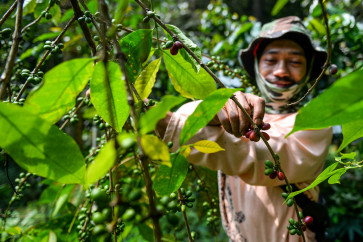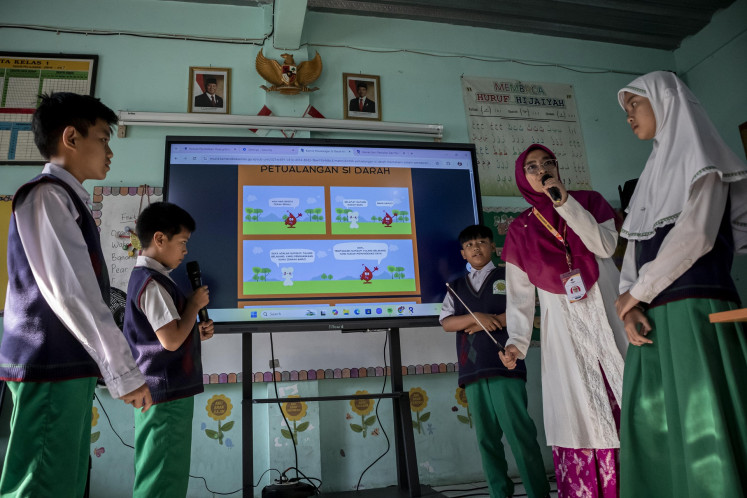Ten years of RSPO: Aiming at the next maturity level
This year will mark the 10th year since the introduction of the Roundtable of Sustainable Palm Oil (RSPO) to the world
Change text size
Gift Premium Articles
to Anyone

T
his year will mark the 10th year since the introduction of the Roundtable of Sustainable Palm Oil (RSPO) to the world. It has not been a smooth ride with regard to bridging some seemingly contradictory concepts, balancing environmental protection with economic performance, corporate governance and social responsibility.
This is a living experiment of coalition and consensus building among key players, who previously were seen as sworn enemies, like companies and hard-core NGOs.
The RSPO is an international multi-stakeholder organization and certification program for sustainable palm oil, founded by farmers and oil palm growers (Indonesia and Malaysia), mills, processing plants (including food producers), banks and NGOs (Oxfam, Conservation International, WWF and the Zoological Society of London).
If palm growers want their business units to be certified as sustainable palm oil producers, they must comply with the principles and criteria, which are audited by credible independent comptrollers.
With this collaborative process between companies and NGOs, the adoption of an RSPO certification scheme since it was introduced in 2007 is astonishing. About 15 percent (and increasing) of the palm oil produced globally has been certified sustainable.
Currently, certified sustainable palm oil with segregated/physical trading can earn up to US$20-40 premium per ton, while certificate/book & claim trading can earn about $3 premium per ton.
During the 10 years of the RSPO's existence, there were some stages when oil palm growers felt tricked and mistreated by other players, especially NGOs, retailers, processors, and banks. This was defined by some feeling of wasting of time for engaging with broader stakeholders and acted as if nothing needs to be changed.
The Indonesian association of palm oil growers withdrew its membership from the RSPO in 2011.
The Indonesian government launched a mandatory Indonesia Sustainable Palm Oil (ISPO) program two years ago, without the proper participation of other stakeholders, especially NGOs and consumers along the supply chain.
The Malaysian government, as represented by the plantation, industries and commodities minister also has announced plans to launch a voluntary Malaysian Sustainable Palm Oil (MSPO) program this year but also without the participation of other stakeholders as NGOs and industrial users. But these programs will not have market incentive (premium price) and credibility.
Nevertheless, all these certification programs, will contribute to raising the bar on the industry standard.
Up to this point, the RSPO's sustainable palm oil standards and certification is still drawing mixed reaction among the Indonesian palm oil growers.
The skeptics argued that the RSPO was too restrictive, which had prevented new development through deforestation and greenhouse gas (GHG) issues.
Nevertheless, there is a growing awareness among people all over the world on the direct link between natural disasters, such as floods, droughts, typhoons and rising sea levels and climate change due to greenhouse gas (GHG) emissions.
Such global environmental issues are no longer considered as 'fear monger' subjects created by environmentalists, but a reality all we are all facing today.
Therefore, it is only a matter of time until all palm oil companies realize they need to commit to prevention of deforestation and reduction of GHG emissions as an integral part of their operational norms.
The majority of Indonesian growers chose not to join the RSPO but instead advocate for another certification program, the ISPO, as an alternative.
On the other hand, the proponents of the RSPO contend that the sustainability standard has contributed to gaining green credibility of environmental stewardship and social responsibility of the industry.
Simultaneously, it also significantly improves operational excellence with the adoption of best management practices. These companies opt to join the RSPO as ordinary members.
The benefits of being an RSPO-certified company are enormous both in tangible monetary terms and with regards to reputation. First, the measurable benefit is obtaining a premium price for certified sustainable palm oil (CSPO), either through physical trading with a higher premium rate or the most simple but less premium rate of certificate trading through the green plan.
Second, access to financial sources that require green credentials for their borrowers or clients, particularly palm oil companies. More banks and investors use RSPO membership and commitment as sustainability platform, a sine qua non for loans and financial support.
Third, access to the growing niche market for edible oil for both food and biofuel in the EU. Such strict market requirements can only be met by RSPO-certified sustainable palm oil. Some EU countries have committed to use the RSPO's CSPO from 2015 onward.
Last, it is the reputation factor that also encourages all grower members to join the RSPO. The RSPO has made sustainability a common denominator for palm oil companies, it triggers competition among growers to acquire green credentials and being the best in the sustainability field. Being a committed member of RSPO comes with leverage to acquire green credentials, which is now becoming a prerequisite for credible companies.
Under current circumstances, the RSPO is going to thrive attracting both oil palm growers and other stakeholders alike.
The natural calamities and environmental disasters will further enhance global awareness on the urgency of environmental stewardship and increase pressures to the palm oil companies to abide by the sustainability standards and subscribe to RSPO principles and criteria as the most accepted platform.
The writers are working for members of the Indonesian Growers caucus of the Roundtable on Sustainable Palm Oil (RSPO). The views expressed are personal.









